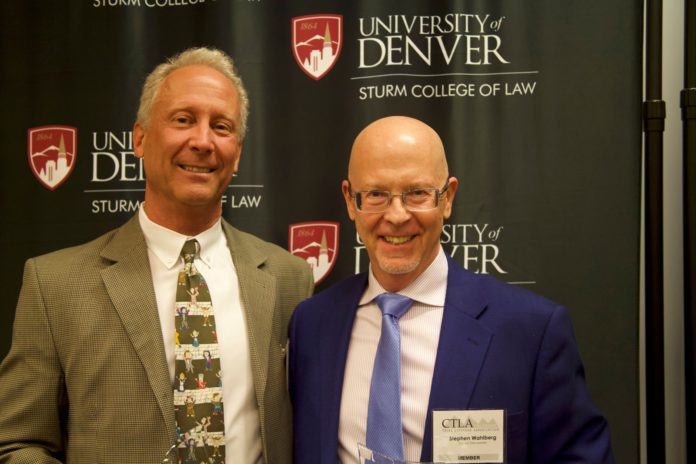
In celebration of professionalism month, the Colorado Defense Lawyers Association and Colorado Trial Lawyers Association recognized members of the opposing bars for setting high standards of professionalism and civility, even when fighting fiercely on behalf of their clients in trial.
Steve Wahlberg, Denver Trial Lawyers founding partner and plaintiff’s side personal injury lawyer received the CDLA’s award, and Scott Nixon, Nixon Shefrin Hensen Ogburn shareholder and defense lawyer received the CTLA’s award.
Wahlberg reminded the attorneys in attendance the importance of professionalism in a courtroom. Everyone in the courtroom is paying attention to the attorney’s behavior. “If our style is comforting, if we’re not challenging everything, if we get right to the point and if they can trust that you’re asking fair questions, it is the way to success.”
For Nixon, professionalism comes down to the lessons everyone learns as a child — whether through citizenship grades in school or Scout Law: play fair, clean up your own mess, tell the truth, keep promises, admit when you’re wrong, volunteer, be kind. He did apply some of those lessons to the law, though, in reminding his colleagues to also trust one another:
“Every plaintiff is not a malingerer. Every defendant isn’t an unindicted co-conspirator,” he said. Choose your battles wisely, keep it professional, don’t get personal, and not only will your practice be more enjoyable, I think you’ll be more effective.”
Wahlberg and Nixon acknowledged that people don’t start their careers as consummate professionals, though, and discussed the mistakes they learned along the way. Both said they had to learn to keep a clear head and to combat their own anger.
“You don’t think clearly when you’re angry,” Nixon said, adding that it’s better to stay calm when faced with a frustrating opponent or a difficult deposition, and to state what you’re going to do if they keep pressing on, rather than storming off.
Wahlberg echoed the sentiment with some advice he gained after he and a defense attorney ended up yelling at each other and leaving a deposition. “You don’t need to meet hostility with hostility,” he said. Instead, use your opponent’s hostility against them.
They discussed the risk that technology presents in feeding those emotions as well. It’s easy to view an opposing attorney simply as an opponent if communication only happens through email or case filings. They both encouraged having a conversation with the opposition early in a case, and Nixon said it’s helpful to meet face to face. And while it’s easy to send an angry email, they encouraged attorneys to stay level-headed and pick up the phone instead.
“Never hit send when you’re emotional,” Wahlberg said. “A position of emotion is a position of weakness. A position of power is what’s right, what’s just, what’s fair.”
The award reception also included a discussion of ethics opinion 137, an exception to Rule of Professional Conduct 8.4(c). The rule states that Colorado lawyers may not participate in dishonesty or deceit — the exception states that lawyers may, however, advise or supervise law enforcement or investigators in their own lawful investigations. According to moderators Heather Salg and Nelson Boyle, the opinion could have significant ramifications for members of both the plaintiff’s and defense bars.
The exception to the rule was created in 2017, in response to complaints about the 1st Judicial District attorney’s involvement in Jefferson County’s CHEEZO program, a sting operation to catch child sexual predators. The exception, and the opinion, don’t only apply to the CHEEZO unit, though, and don’t only apply to criminal investigations. The opinion states that attorneys may also be involved in civil investigations that ferret out illegal activity, such as hiring investigators to pose as customers to reveal businesses’ wrongdoing. But the opinion cautions against crossing lines like inducing wrongdoing, impeding other lawful investigations or using deceptive investigation tactics when other methods are available.
Nixon pointed out, though, that while it might be helpful to have a list of examples of lawful investigations or instances where the exception applies, the opinion offers rules to apply to determine whether certain conduct is allowed.
Wahlberg added his own rule: “If it bothers your stomach, it will probably bother someone else’s.” He said the rule is fact-specific, and whether something is allowed will depend a lot on the facts involved. He urged caution in conduct that might be considered deceptive. “There aren’t any prosecutions at this point, but I guarantee you there will be.”
Salg closed the discussion by reminding the attorneys in attendance to get familiar with the rule. There are gray areas regarding what conduct is now allowed, but in determining where the line is, she said managing partners or other senior partners could be held responsible for the conduct of attorneys or paralegals under their supervision.
— Tony Flesor

